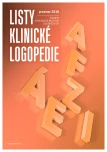-
Medical journals
- Career
Some notes on bilingualism in aphasia
Authors: Mgr. Flanderková Eva, Ph.D.
Authors‘ workplace: Adresa posledního pracoviště (do 31. 7. 2018): Technische Universität Dortmund, Institut für deutsche Sprache und Literatur, Emil-Figge-Str. 50, D-44227 Dortmund
Published in: Listy klinické logopedie 2018; 2(2): 8-12
Category: Main topic
Overview
The article deals with bilingualism in aphasia. First, several questions concerning bilingualism are outlined whereas some of the general standards of bilingual research are mentioned. Second, the particular research on language organization in bilingual mind/brain is given some attention. The third section of the arcticle addresses the spontaneous recovery from bilingual aphasia, sections four and five discuss bilingual aphasia assessment and therapy. The article concludes with a short summary.
Keywords:
bilingualism – aphasia – assessment of bilingual aphasia – therapy of bilingual aphasia – sign language
Sources
- ANSALDO, A. I. – SAIDI, L. G. (2014): Aphasia therapy in the age of globalization: Cross-linguistic therapy effects in bilingual aphasia. Behavioural Neurology, http://dx.doi.org/10.1155/2014/603085.
- DE BOT, K. (1992): The multilingual lexicon: Modeling selection and control. The International Journal of Multilingualism 1(1), s. 17–32.
- CHAMBERS, C. – COOK, H. (2009): Lexical competition during second-language listening: sentence context, but not proficiency, constraints interference from the native lexicon. Journal of Experimental Psychology: Learning, Memory, and Cognition 35(4), s. 1029–1040.
- FABBRO, F. (1999): The neurolinguistics of bilingualism. New York: Psychology Press.
- FABBRO, F. (2001): The bilingual brain: bilingual aphasia. Brain and Language 79, s. 201–210.
- FAROQI-SHAH, Y. – FRYMARK, T. – MULLEN, R. – WANG, B. (2010): Effect of treatment for bilingual individuals with aphasia: A systematic review of the evidence. Journal of Neurolinguistics 23, s. 319–341.
- FLANDERKOVÁ, E.: Čeština v afázii: teorie a empirie. V tisku.
- GORAL, M. – LEVY, E. – KASTL, R. (2010): Cross-language treatment generalisation: A case of trilingual aphasia. Aphasiology 24(2), s. 170–187.
- GROSJEAN, F. (1989): Neurolinguists, beware! The bilingual is not two monolinguals in one person. Brain and Language 36, s. 3–15.
- GROSJEAN, F. – LI, P. (2016): The psycholinguistics of bilingualism. Chichester – Mandel – Oxford: Wiley-Blackwell.
- JABŮREK, J. (1998): Bilingvální vzdělávání neslyšících. Praha: Septima.
- JUNCOS-RABADÁN, O. (2015): Bilingual aphasia. In: International encyclopedia of the social & behavioral sciences, 2. vyd., díl 2., Elsevier, s. 574–579.
- KHACHATRYAN, E. – VANHOOF, G. – BEYENS, H. – GOELEVEN, A. – THIJS, V. – VAN HULLE, M. M. (2016): Language processing in bilingual aphasia: a new insight into the problem. Wiley interdisciplinary reviews, Wires / Cognitive science 7/3, Malden, MA: Wiley-Blackwell, s. 180–196.
- KIRAN, S. – SANDBERG, Ch. – GRAY, T. – ASCENSO, E. – KESTER, E. (2013): Rehabilitation in bilingual aphasia: evidence for within - and between-language generalization. American Journal of Speech and Language Pathology 22, s. 298–309.
- LACHOUT, M. (2017): Bilingvismus a bilingvní výchova na příkladu bilingvismu česko-německého. Praha: Togga: Metropolitan University Prague Press.
- LEVELT, W. J. M. (2013): A history of psycholinguistics: The pre-Chomskyan era. Oxford: Oxford University Press.
- MERTINS, B. (2016): The use of experimental methods in linguistic research: advantages, problems and possible pitfalls. In: Anstatt, T. – Gattnar, A. – Clasmeier, Ch. (eds.): Slavic languages in psycholinguistics, Tübinger Beiträge zur Linguistik, 554, s. 15–33.
- MIERTSCH, B. – MEISEL, J. M. – ISEL, F. (2009): Non-treated languages in aphasia therapy of polyglots benefit from improvement in the treated language. Journal of Neurolinguistics 22, s. 135–150.
- PARADIS, M. (2004): A neurolinguistic theory of bilingualism. Amsterdam: J. Benjamins.
- SCHMIEDTOVÁ, B. – FLANDERKOVÁ, E. (2012): Neurolingvistika: předmět, historie, metody. Slovo a slovesnost 73, s. 46–62.
- SVOBODOVÁ, J. (2014): Bilingvismus a interference – slovanské jazyky. Plzeň: Západočeská univerzita.
- ŠTEFÁNIK, J. (2004). Antológia bilingvizmu. Bratislava: Academic Electronic Press.
- WEEKES, B. S. (2010): Issues in bilingual aphasia: An introduction. In: Aphasiology 24(2), s. 123–125.
Labels
Clinical speech therapy General practitioner for children and adolescents
Article was published inClinical speech therapy (Listy klinické logopedie)

2018 Issue 2-
All articles in this issue
- Editorial
- Primary progressive aphasia
- Some notes on bilingualism in aphasia
- Agrammatism in speech production in a patient after resection of tumour in the temporoparietal region of the left hemisphere
- Functional magnetic resonance in relation to languages centers
- Acquired childhood aphasia
- Use of digital technologies for therapy of patients after stroke
- Neurocognitive Rehabilitation in Patients with Aphasia
- Tady a tam aneb Jaké je to studovat logopedii v zahraničí? Rozhovor s Alenou Netolickou a Vilmou Mikešovou
-
Na skupinových terapiích prakticky nelze vyhořet
Rozhovor s Mgr. Zuzanou Konůpkovou o Klubu afasie, z. s. -
Recenze knihy
Poruchy vývoje řeči – Olga Dlouhá et al. - Aphasia through the eyes of the public
- Služby klientům s afázií
-
Jak se logopedka, ergoterapeutka a pes ocitli na psychiatrii
Rozhovor s Ester Lochmanovou a Nikolou Svobodovou o práci v Psychiatrické nemocnici Bohnice - Dostupné materiály pro terapii afázie v klinické praxi
- Rozhovor s PaedDr. Annou Salomonovou nejen o tom, jak spolu mohou tuberkulóza a logopedie souviset
- Videofluoroscopy in children
- Clinical speech therapy (Listy klinické logopedie)
- Journal archive
- Current issue
- Online only
- About the journal
Most read in this issue- Dostupné materiály pro terapii afázie v klinické praxi
- Acquired childhood aphasia
- Primary progressive aphasia
- Služby klientům s afázií
Login#ADS_BOTTOM_SCRIPTS#Forgotten passwordEnter the email address that you registered with. We will send you instructions on how to set a new password.
- Career

